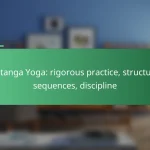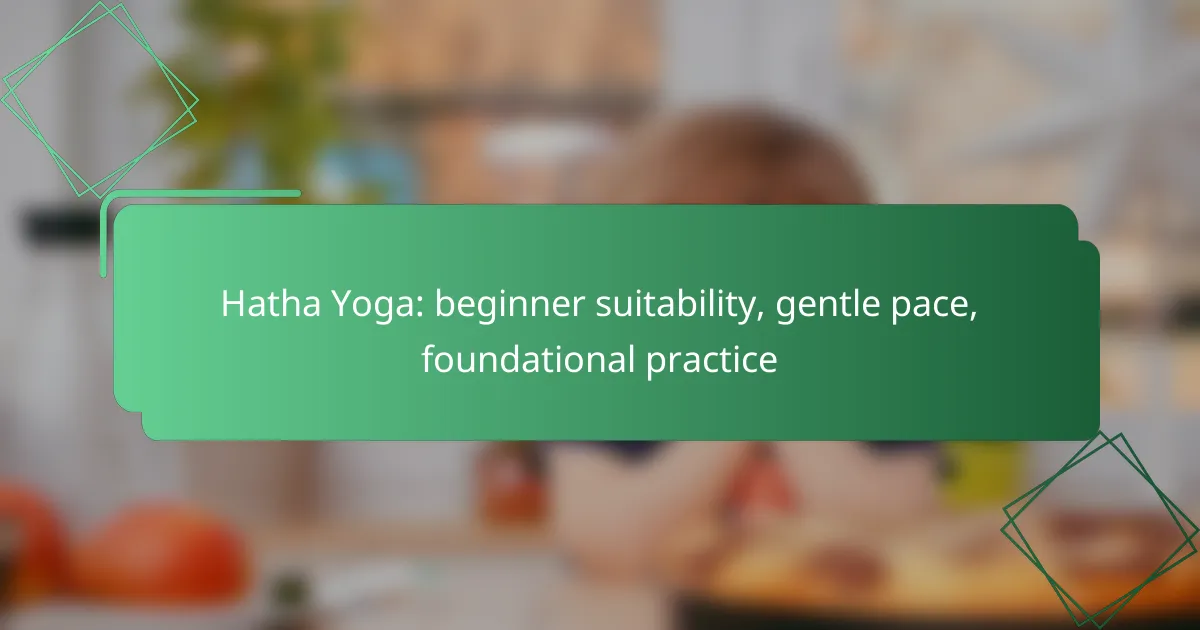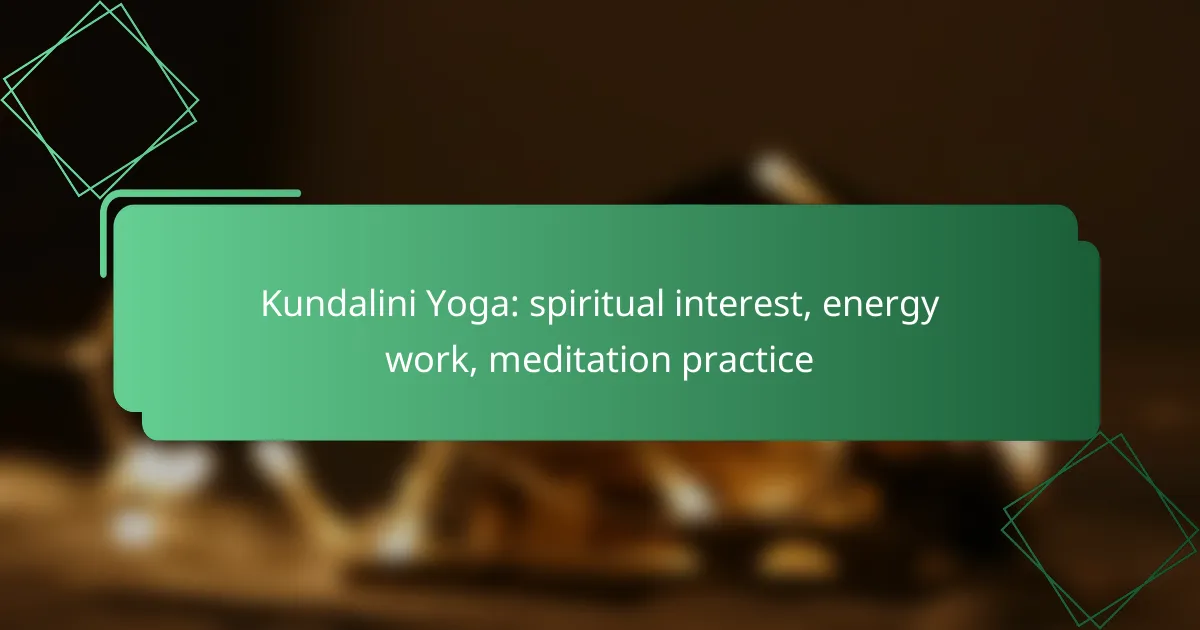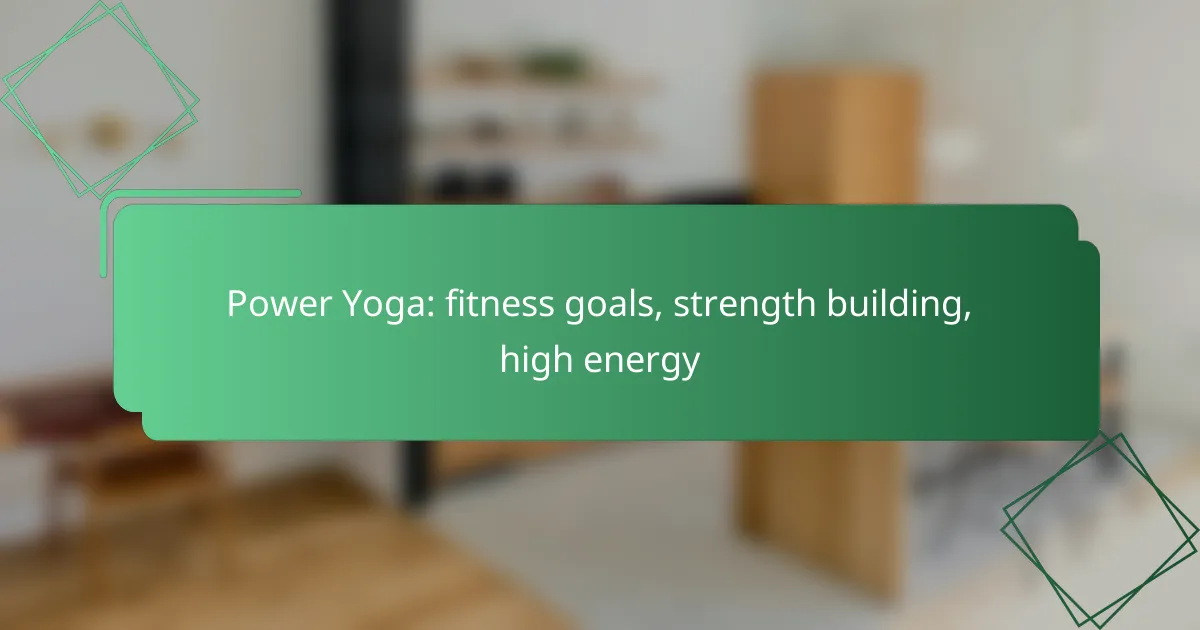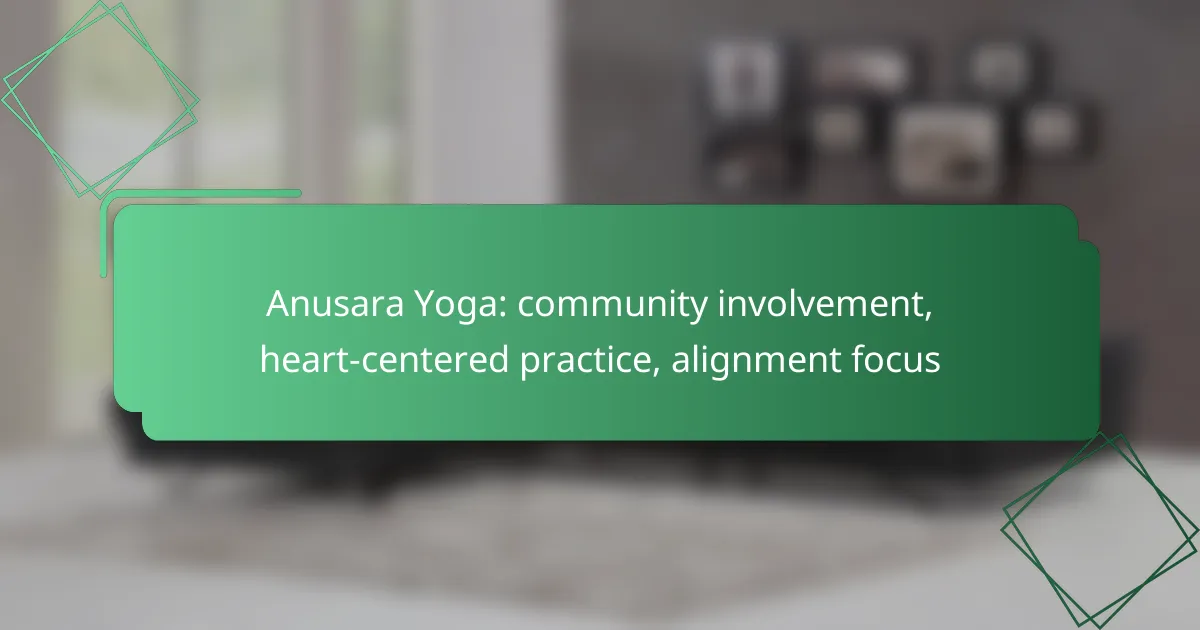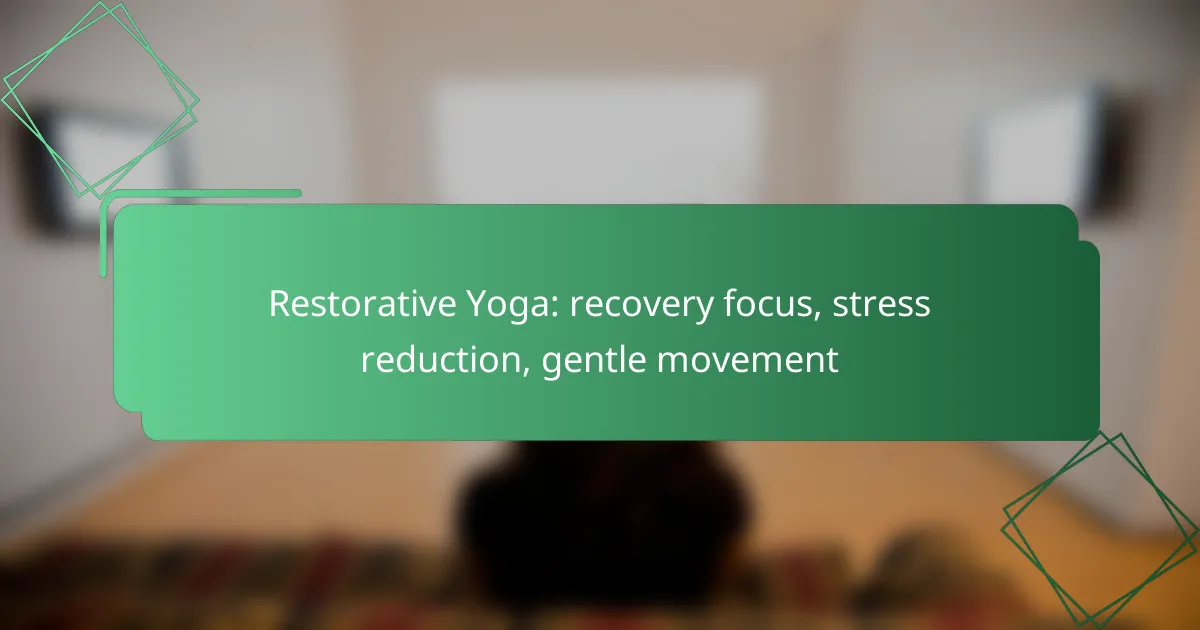Hatha Yoga is an excellent choice for beginners, offering a gentle approach that emphasizes foundational practices. With its slower pace, it allows newcomers to build strength, flexibility, and mindfulness at their own comfort level. This style focuses on postures and breath control, making it accessible and ideal for those looking to explore yoga without the intensity of more dynamic forms.
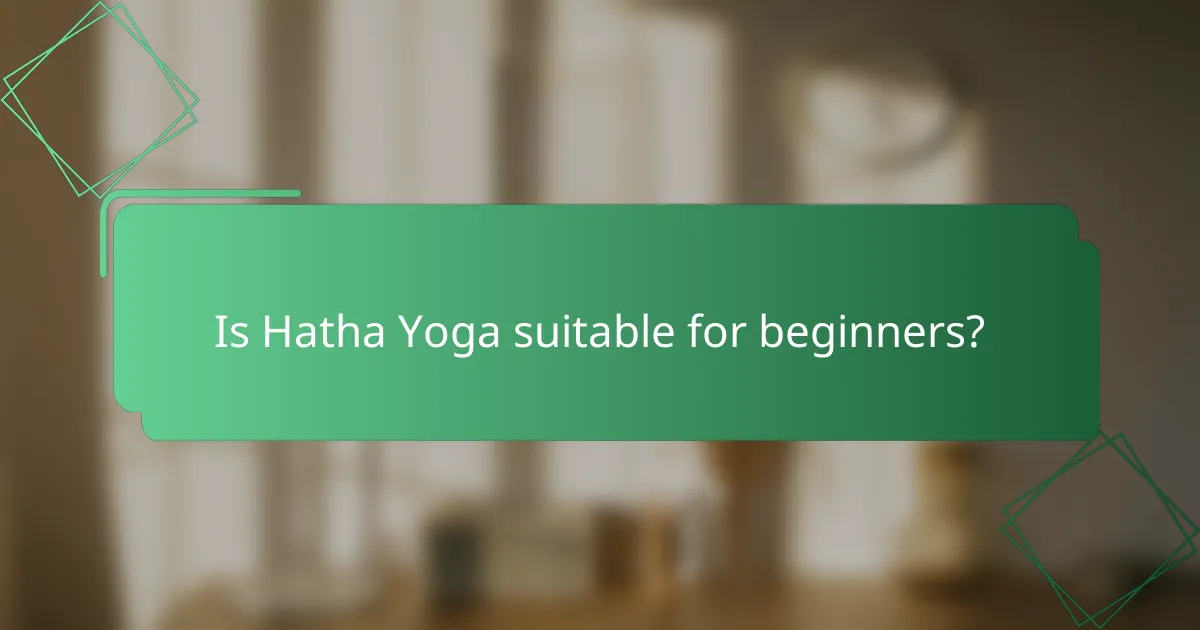
Is Hatha Yoga suitable for beginners?
Yes, Hatha Yoga is highly suitable for beginners due to its gentle approach and focus on foundational practices. It provides an accessible entry point for individuals new to yoga, allowing them to build strength, flexibility, and mindfulness at their own pace.
Accessible for all fitness levels
Hatha Yoga is designed to accommodate practitioners of varying fitness levels, making it a great choice for beginners. Whether you are completely new to exercise or have some experience, Hatha classes typically offer modifications to suit individual capabilities.
Instructors often provide options for each pose, allowing participants to choose the variation that feels most comfortable. This inclusivity helps foster a supportive environment where everyone can progress at their own speed.
Focus on foundational poses
The practice emphasizes foundational poses that build strength and flexibility, which are essential for more advanced yoga styles. Beginners can expect to learn basic postures such as Downward Dog, Warrior I, and Child’s Pose, which serve as the building blocks for their practice.
By mastering these key poses, beginners can develop a solid understanding of body alignment and breathing techniques, which are crucial for safe and effective practice in the future.
Gentle pace promotes comfort
Hatha Yoga is characterized by its gentle pace, allowing beginners to ease into their practice without feeling rushed. This slower tempo encourages mindfulness and helps practitioners focus on their breath and body sensations.
Classes typically include ample time for each pose, enabling students to explore their limits and make adjustments as needed. This approach not only enhances comfort but also reduces the risk of injury, making it an ideal choice for those new to yoga.
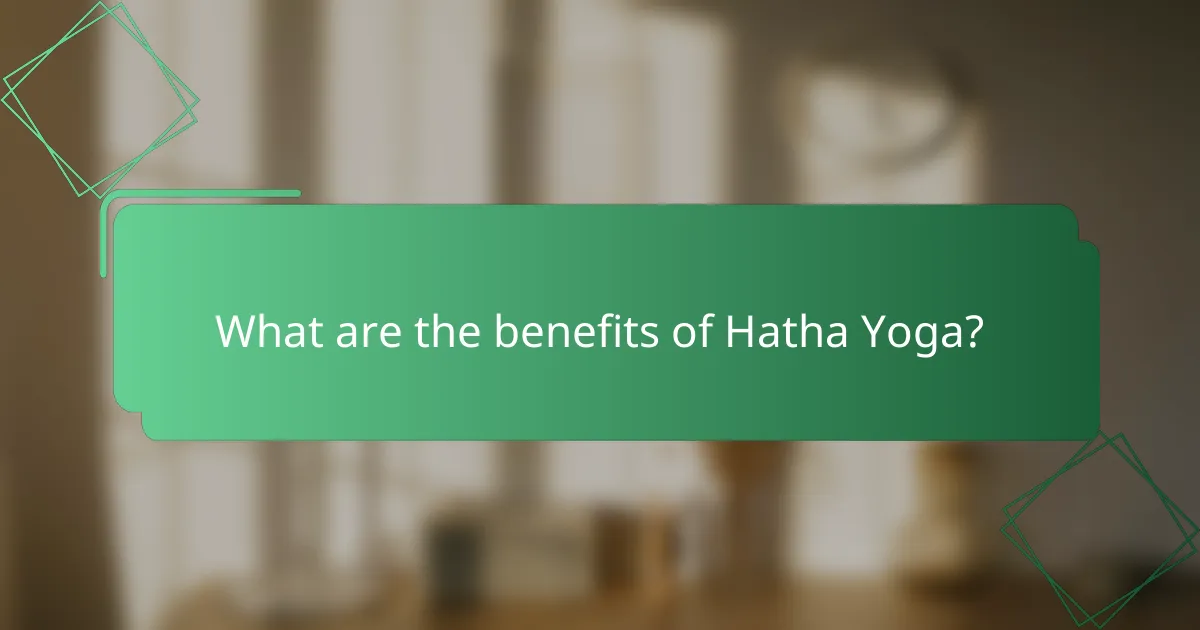
What are the benefits of Hatha Yoga?
Hatha Yoga offers numerous benefits, particularly for beginners, as it emphasizes a gentle pace and foundational practices. This style of yoga helps improve physical health, mental well-being, and overall quality of life.
Improves flexibility and strength
Hatha Yoga is particularly effective in enhancing flexibility and building strength. The various postures, or asanas, stretch and strengthen different muscle groups, making it accessible for individuals of all fitness levels. Regular practice can lead to noticeable improvements in flexibility within a few weeks.
To maximize these benefits, focus on holding each pose for several breaths and gradually increasing the duration as your body adapts. Incorporating a variety of poses that target different areas, such as forward bends, backbends, and twists, can further enhance your progress.
Enhances mental clarity and relaxation
Practicing Hatha Yoga can significantly enhance mental clarity and promote relaxation. The combination of physical movement, breath control, and meditation fosters a calm mind and helps reduce mental clutter. This holistic approach encourages mindfulness, which can improve focus and cognitive function.
To experience these benefits, dedicate time to practice mindfulness during your sessions. Pay attention to your breath and the sensations in your body, allowing yourself to fully engage in the present moment.
Supports stress reduction
Hatha Yoga is an effective tool for stress reduction, as it encourages relaxation and mindfulness. The slow-paced nature of this practice allows individuals to unwind and release tension accumulated throughout the day. Incorporating deep breathing techniques can further enhance the calming effects.
To effectively manage stress through Hatha Yoga, consider setting aside time each week for a dedicated practice. Aim for sessions that last at least 30 minutes, focusing on poses that promote relaxation, such as Child’s Pose and Savasana. Regular practice can lead to long-term improvements in stress management and emotional resilience.
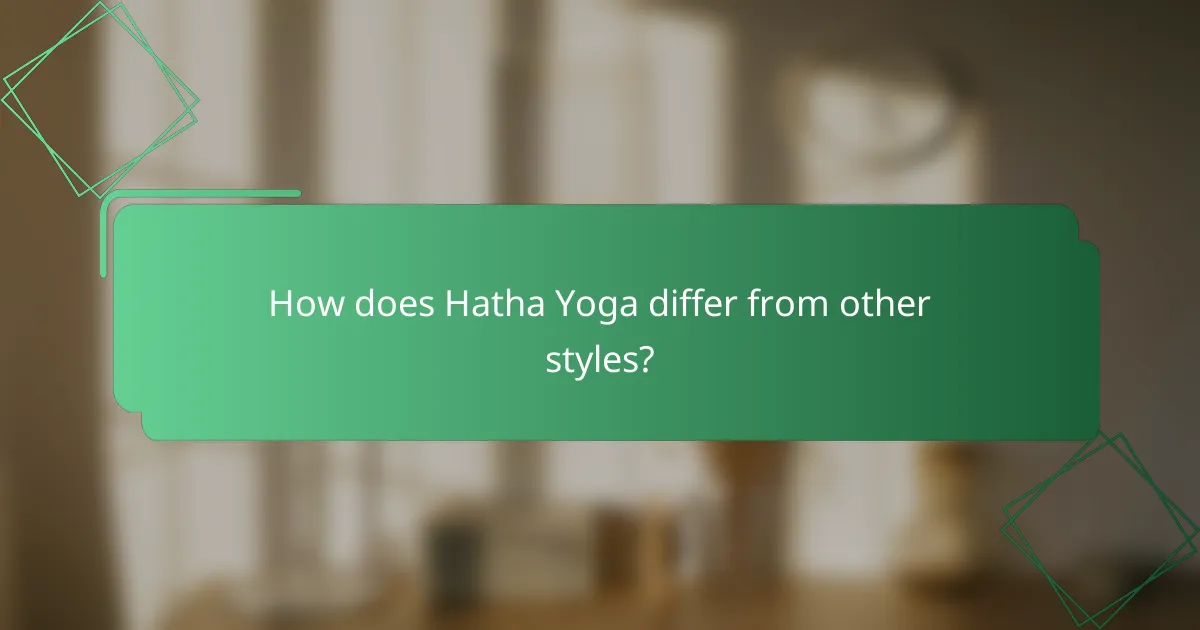
How does Hatha Yoga differ from other styles?
Hatha Yoga is distinct from other yoga styles primarily due to its focus on postures and breath control, making it accessible for beginners. Unlike more dynamic styles, Hatha emphasizes a slower, more deliberate approach to practice, allowing for deeper exploration of each pose.
Emphasis on alignment and breathing
Hatha Yoga places significant importance on proper alignment and breath awareness. Practitioners are encouraged to maintain correct posture to prevent injury and enhance the benefits of each pose. This focus on alignment helps cultivate mindfulness, making it easier to connect with one’s breath during practice.
Instructors often provide detailed cues to ensure students are positioned correctly, which is especially beneficial for beginners who may not yet be familiar with the nuances of each asana.
Slower pace compared to Vinyasa
Hatha Yoga is characterized by a slower pace compared to Vinyasa, which links breath with movement in a more fluid manner. In Hatha classes, poses are typically held for longer durations, allowing practitioners to deepen their understanding of each posture. This slower tempo is ideal for those new to yoga, as it provides ample time to learn and adapt.
For beginners, this gentler approach can reduce the risk of injury and foster a more relaxed environment, making it easier to focus on the fundamentals of yoga practice.
Foundation for other yoga styles
Hatha Yoga serves as a foundational practice for many other styles, such as Ashtanga and Iyengar. By mastering the basic postures and breathing techniques in Hatha, practitioners can transition more easily into these more advanced forms of yoga. This foundational knowledge builds confidence and prepares students for the physical demands of other styles.
Many yoga schools recommend starting with Hatha to establish a solid base, making it a practical choice for anyone looking to explore the broader world of yoga.
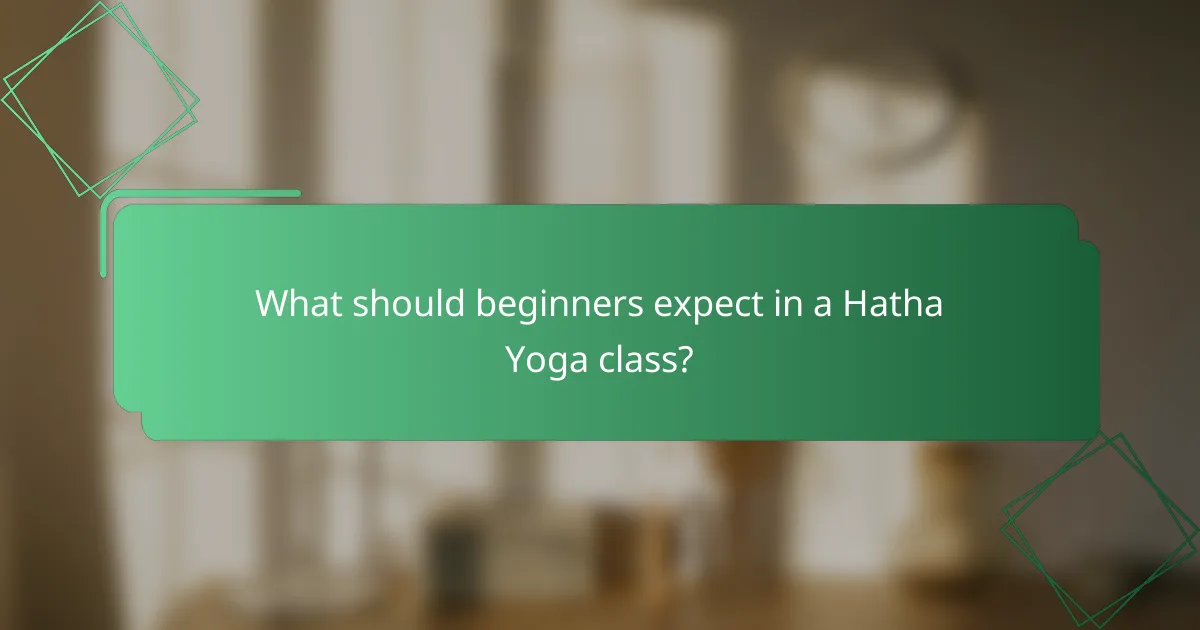
What should beginners expect in a Hatha Yoga class?
Beginners in a Hatha Yoga class can expect a gentle pace that emphasizes foundational postures and breath control. The class typically includes a series of poses designed to improve flexibility, strength, and relaxation, making it suitable for those new to yoga.
Introduction to basic postures
In Hatha Yoga, basic postures serve as the building blocks for practice. Beginners will learn fundamental poses such as Mountain Pose, Downward Dog, and Child’s Pose, which help establish proper alignment and body awareness. Each posture is usually held for several breaths, allowing participants to gradually deepen their understanding and comfort.
It’s important for beginners to focus on their own range of motion and avoid pushing themselves into discomfort. Using props like blocks or straps can assist in achieving proper alignment and support during the poses.
Focus on breath awareness
Breath awareness is a key component of Hatha Yoga, helping practitioners connect movement with breath. Beginners will learn to synchronize their inhalations and exhalations with each posture, promoting relaxation and mindfulness. This practice not only enhances physical performance but also calms the mind.
To cultivate breath awareness, beginners can practice simple techniques such as Ujjayi breath, which involves slightly constricting the throat to create a soft sound during inhalation and exhalation. This technique can be particularly helpful in maintaining focus throughout the class.
Guided relaxation techniques
Guided relaxation techniques are often incorporated at the end of a Hatha Yoga class to help participants unwind. Beginners may experience practices such as Savasana (Corpse Pose), where they lie still and focus on their breath, allowing the body to absorb the benefits of the practice.
Instructors may also lead guided visualizations or body scans, encouraging students to release tension and cultivate a sense of peace. These techniques are beneficial for reducing stress and enhancing overall well-being, making them an essential part of the Hatha Yoga experience for beginners.
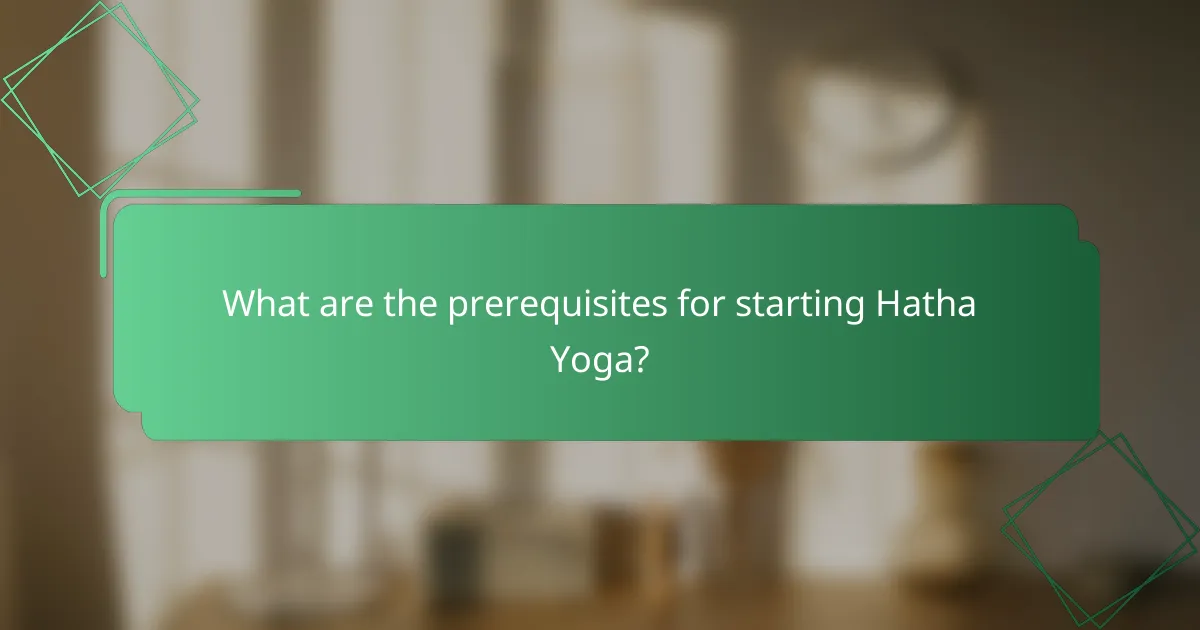
What are the prerequisites for starting Hatha Yoga?
Hatha Yoga is accessible to nearly everyone, with no specific prerequisites required to begin. It emphasizes a gentle pace and foundational practices, making it suitable for beginners and those looking to ease into yoga.
No prior experience required
Hatha Yoga is designed for individuals of all skill levels, including complete beginners. You don’t need any previous yoga experience to start; the practice focuses on basic postures and breathing techniques that anyone can learn. This makes it an ideal entry point for those new to yoga.
Many classes are structured to accommodate beginners, often including detailed instructions and modifications for different abilities. Look for classes labeled as “beginner” or “gentle” to ensure a supportive environment.
Comfortable clothing recommended
Wearing comfortable clothing is essential for practicing Hatha Yoga, as it allows for ease of movement and flexibility. Opt for breathable fabrics that stretch, such as cotton or moisture-wicking materials. Avoid overly loose clothing that may get in the way during poses.
Many practitioners choose yoga-specific attire, such as leggings and fitted tops, which can enhance comfort and performance. Ensure your clothing is not restrictive to fully enjoy the practice.
Awareness of personal limitations
Understanding your personal limitations is crucial when starting Hatha Yoga. Listen to your body and recognize any discomfort or pain, as pushing too hard can lead to injury. It’s important to practice at your own pace and modify poses as needed.
Consider consulting with a healthcare provider if you have any pre-existing conditions or concerns before starting. Many classes offer variations for different skill levels, so don’t hesitate to ask instructors for modifications that suit your needs.
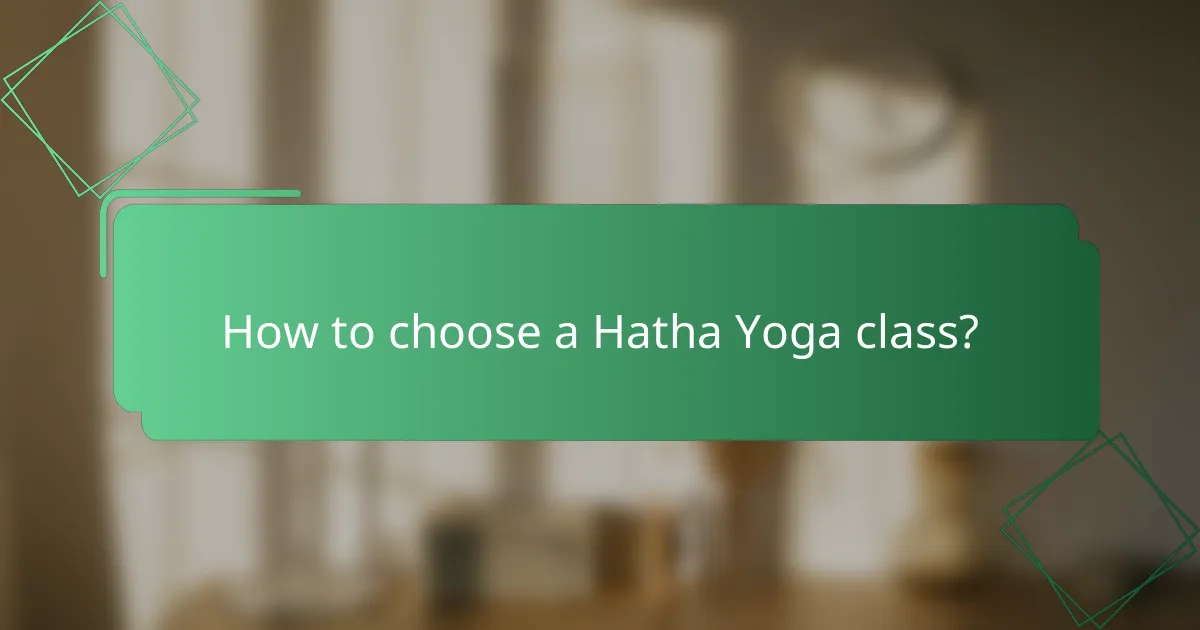
How to choose a Hatha Yoga class?
Choosing a Hatha Yoga class involves considering the instructor’s qualifications, the class size, and the convenience of the location and schedule. These factors help ensure a supportive and effective learning environment for beginners.
Look for certified instructors
Certified instructors have undergone training that meets established standards, ensuring they are knowledgeable about Hatha Yoga principles and practices. Look for instructors who hold certifications from recognized organizations, such as Yoga Alliance or similar bodies.
Instructors with experience in teaching beginners can provide essential guidance on proper alignment and breathing techniques, which are crucial for a safe practice. Don’t hesitate to ask about their qualifications before enrolling in a class.
Check class size for personal attention
Smaller class sizes typically allow for more personalized attention from the instructor, which is beneficial for beginners. Aim for classes with a maximum of 10 to 15 students, as this can facilitate better feedback and adjustments to your practice.
In larger classes, it may be challenging for instructors to provide individual corrections, which can lead to improper techniques. If possible, observe a class before joining to gauge the instructor’s ability to engage with students.
Consider location and schedule
Choosing a conveniently located Hatha Yoga class can significantly impact your commitment to practice. Look for studios or community centers that are within a reasonable distance from your home or workplace.
Additionally, check the class schedule to ensure it aligns with your availability. Many studios offer classes at various times throughout the week, so find one that fits your routine to maintain consistency in your practice.
